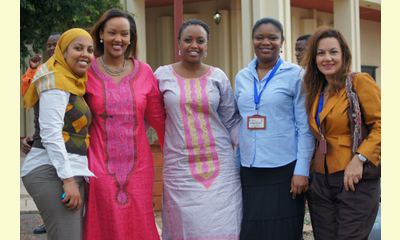|
|
10th Anniversary of The Maputo Protocol on the Rights of Women in Africa
an article by Elena Georgalla
July 11, 2013 marks the celebration of ten years since the Protocol to the African Charter on Human and Peoples' Rights on the Rights of Women in Africa, commonly referred to as The Maputo Protocol, was adopted in Mozambique on July 11, 2003. It went into effect in November 2005 after 15 of the 53 African Union Members States ratified it.

Members of FEMNET, including Executive Director Dinah Musindarwezo (second from left)
click on photo to enlarge
The Maputo Protocol is a ground-breaking women's rights legal instrument that expands and reinforces the rights provided in other human rights instruments. The Protocol provides a broad range of economic and social welfare rights for women and thus constitutes a radical step towards combating discrimination and violence against women in Africa. Most remarkably, it was produced by Africans for Africans and creates a platform for the concern of African women to be taken centre stage.
The protocol among others requires African governments to eliminate all forms of discrimination and violence against women in Africa, and to promote equality between men and women. Member States are obliged to integrate a gender perspective in their policy decisions, legislation, development plans, and activities, and to ensure the overall well being of women.
To commemorate this special occasion of the 10th anniversary of the Maputo Protocol, Make Every Woman Count (MEWC), a young African women-led organisation that promotes and advocates for the empowerment and rights of African women and girls, held an interview on the significance of the Maputo Protocol with Dinah Musindarwezo the Executive Director of FEMNET (African Women's Development and Communications Network). Working closely with the SOAWR coalition (Solidarity for African Women's Rights) , FEMNET actively advocated for the adoption, ratification and implementation of the Maputo Protocol.
In July 11, we will be celebrating the 10th Anniversary of the Maputo Protocol. How has the protocol ratification process progressed since 2003? What have been the challenges so far?
Ten years after the Protocol came into effect, we celebrate 37 ratifications. Therefore, I would say that the ratification has progressed well. There are some countries that achieving ratification has not been easy. For example Cameroon had initially ratified in 2009. However, due to religious opposition, the instrument was not deposited to the AUC which means this could not be counted as a ratification. FEMNET together with SOAWR had to carry out a lot of advocacy and lobbying including organising and carrying out a high level Advocacy mission to Cameroon to speak with the Government officials. The Mission was carried out in September 2012. By January 2013, Cameroon had officially ratified the protocol.
To read the Maputo Protocol document, please click here.
What needs to be done to ensure that the Protocol is implemented effectively so that women in Africa are able to fully realize their rights?
See the discussion for strategies that can be used to ensure effective implementation.
(This article is continued in the discussionboard)
|








|
DISCUSSION
There is no question yet associated with this article.
* * * * *
LATEST READER COMMENT:
(The following is continued from the main article listed above.)
There are several strategies that can be used to ensure effective implementation. These include; mass popularization of the Protocol, mobilizing women’s rights organisations to hold their governments to account for what they have committed to, lobbying governments to domesticate the protocol and working with the AUC to monitor the implementation of the protocol. In addition, since we have seen that religious leaders are a major opposition to the protocol, it is important to work with them, sensitize them about the protocol and its importance in promoting women’s rights. Very often the protocol is misunderstood, you find people saying that ratifying the protocol means signing to legalising and promoting abortion and homosexuality, resulting in a lot of resistance by anti-choice campaigners without a clear understanding of the provisions laid out in the protocol. It is therefore important to present the Protocol in a simple manner that is easily understood by the majority of African citizens in order to popularize the protocol further.
What are the most pressing issues for women in Africa? And what are the primary actions to take in response to those issues?
In my opinion, some of the most pressing issues affecting women in Africa is violence against women in all its forms and discrimination of women in owning and control of resources, especially land. It is mainly because of gender discrimination that women experience many other issues such as lack of sexual and reproductive rights, that majority of women are poorer, many work in the informal sector with no protection and benefits and few women are in decision-making positions in both private and public sectors.
There is a need to work towards changing gender/power relations through changing economic, social and political policy frameworks that perpetuate gender discrimination. This must be followed by change of attitudes by both men and women towards men and women and their gender roles.
. . ...more.

|
|








